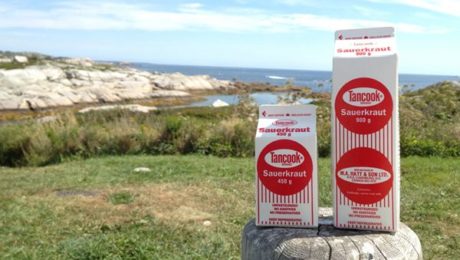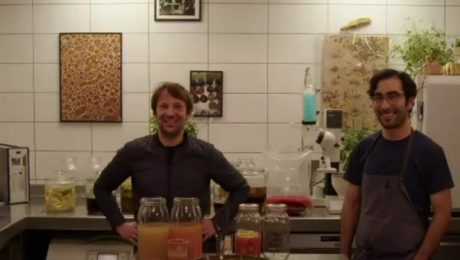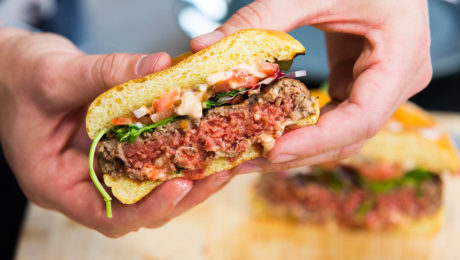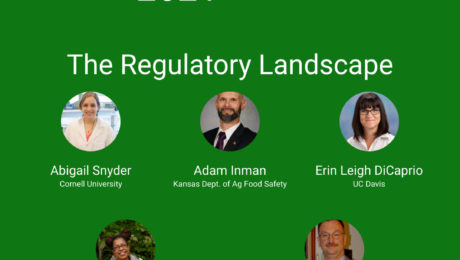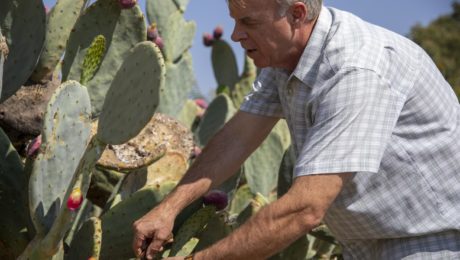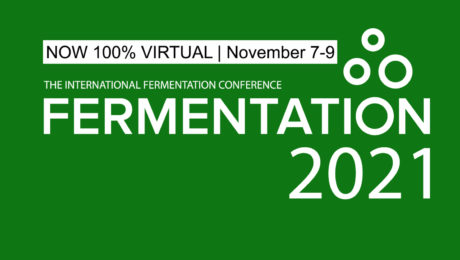Pandemic Closes 75-Year-Old Sauerkraut Producer
Beloved Canadian sauerkraut brand Tancook is shutting down after 75 years. The iconic Nova Scotia traditional sauerkraut, which is packaged in a milk carton, was even the subject of Philip Moskovitz’s book Adventures in Bubble and Brine: What I Learned from Nova Scotia’s Masters of Fermented Foods, Craft Beer, Cider, Cheese, Sauerkraut, and More.
Owners Hatt and Son Ltd. announced the closure on social media, posting “due to financial implications of the Covid-19 pandemic, we have made the difficult decision to end production.” Owner Cory Hatt said “difficult decisions” had to be made and he did not want to discuss it further with media outlets.
Tancook’s history is rich in Canada. German immigrants found that cabbage thrived on Nova Scotia’s Big Tancook Island, where they fertilized it annually with seaweed. Tancook sauerkraut became a popular condiment for seafaring ships, who would pick up barrels of it to combat scurvy in sailors and provide them nutrition during long, maritime winters.
Tancook Brand Sauerkraut was later produced commercially in Lunenburg County in Nova Scotia, using the same recipe brought from the island by the great-grandfather of Hatt. It remained a traditionally fermented product.
A social media campaign has already launched, aiming to find a buyer for the brand.
Read more (CBC)
- Published in Business
Food and Beverage Laws Passed in 2021
After the Covid-19 pandemic shortened their legislative sessions last year, lawmakers across the 50 states had a productive year in 2021. State leaders were able to pass hundreds of bills relating to food, beverages and food service.
Numerous new laws were aimed at helping restaurants survive — permitting permanent outdoor dining spaces, allowing carryout food services and to-go alcohol sales. Many of these regulations had been enacted in 2020 as temporary, emergency measures to aid restaurateurs, but expired this year.
This year was also big for cottage food laws. As more people experimented in their home kitchens during the pandemic, there was pressure to modernize cottage food laws. Over half the states updated their laws in 2021, regulating sales of homemade food.
Below are the key food, beverage and food service laws passed this year in, alphabetically, Alabama through Maryland. We’ll feature the balance of the states — Massachusetts to Wyoming — in TFA’s next newsletter (January 12, 2022).
Alabama
HB12 — Extends protections granted for cottage food businesses to include roasted coffees and gluten-free baking mixes.
HB539 — Increases the amount of alcohol which breweries and distilleries can sell to customers for off-premise consumption.
SB126 — Allows licensed state businesses to deliver wine, beer and spirits to customers’ homes.
SB160 — An update to Alabama’s cottage food law, SB160 allows for most non-perishable foods to be made in home-based food businesses without commercial licenses (instead of just only baked goods, jams/jellies, dried herbs and candies). It also removes the $20,000 sales limit for home-based food businesses. It also allows online sales and in-state shipping of products.
SB167 — Permits Alabama wineries to sell directly to consumers at special events.
SB294 — Authorizes wine manufacturers to sell directly to retailers without a distributor.
SB397 — Allows opening of wineries in Alabama’s 24 dry counties. The wineries will be allowed to produce and operate in a dry county, but they may not sell on premise.
Alaska
HB22 — Legalizes herd share agreements for the distribution of raw milk in the state.
Arizona
HB2305 — Amends law to allow two or more liquor producers, craft distillers or microbrewery licenses at one location.
HB2753 — States that licensed producers, craft distillers, brewers and farm wineries are subject to rules and exemptions prescribed by the FDA. Exempts production and storage spaces from state regulation.
HB2773 — Allows bars, liquor stores and restaurants to sell cocktails to-go.
HB2884 — Exempts alcohol produced on premise in liquor-licensed businesses from food safety regulation by the Arizona Department of Health Services, which adds rules regarding production, processing, labeling, storing, handling, serving, transportation and inspection. Specifies that this exemption includes microbreweries, farm wineries and/or craft distilleries.
Arkansas
HB118 — Permits the sale of cottage foods over the internet. Interstate sales are permitted if the producer complies with federal food safety regulations.
HB1228 — Allows for municipalities in dry counties to apply to be an entertainment district, just like in wet counties.
HB1370 — Establishes mead as an allowed liquor for a small farm winery — and allows wineries to ship mead. Also allows for mead to be taxed in the same manner as wine.
HB1426 — Establishes the Arkansas Fair Food Delivery Act, stating that a food delivery platform (like UberEats) must have an agreement with a restaurant or facility to take food orders and deliver food prepared.
HB1763 — Allows distilleries to self distribute their own products and allows out-of-state, direct-to-consumer shipments.
HB1845 — Restricts advertising alcohol in microbrewery-restaurants in dry counties.
SB248 — Replaces Arkansas’ cottage food law with the Food Freedom Act. Allows all types of non-perishable foods to be sold almost anywhere without a food safety license and certification, including grocery stores and retail shops.
SB339 — Allows permitted restaurants to sell on-the-go alcoholic beverages.
SB479 — Allows restaurants with alcohol beverage permits to expand outdoor dining without approval of the Alcoholic Beverage Control Division.
SB554 — Authorizes beer wholesalers to distribute certain ready-to-drink products.
SB631 — Authorizes a hard cider manufacturer to deliver hard cider.
California
AB61 — Allows restaurants and bars with alcohol licenses that added temporary, outdoor sidewalk dining spaces during the Covid-19 pandemic to continue serving alcohol in these spaces.
AB239 — Allows wineries to refill wine bottles at off-site tasting rooms, similar to breweries reusing growlers
AB286 — Requires third-party delivery companies to itemize cost breakdowns of delivery transactions to both restaurants and customers.
AB425 — Updates regulations regarding definitions, assessments, fees and funding mechanisms for the Dairy Council of California.
AB831 — Mandates that all labels on cottage food must include the disclaimer “Made in a Home Kitchen” along with the producer’s county and cottage food permit number.
AB941 — Establishes a grant program for counties to apply for farmworker resource centers, supplying farmworkers and their families information on education, housing, payroll, wage rights and health services.
AB962 — Requires the creation of a returnable bottle system in the state by 2024. Allows recyclable bottles to be washed and refilled by beverage producers rather than being crushed for recycling.
AB1144 — Updates California’s outdated cottage food laws, raising sales limit to either $75,000 (Class A permits) or $150,000 (Class B permits) and simplifying the approval process for sampling cottage food products. Also allows homemade food to be sold online.
AB1200 — By 2023, no eatery in California is permitted to distribute or sell food packaging that contains regulated perfluoroalkyl and polyfluoroalkyl substances or PFAS. Manufacturers of food packing must use the least toxic alternative when replacing their food packaging. Food packaging includes food or beverage containers, take-out containers, liners, wrappes, eating utensils, straws, disposable plates, bowls and trays.
AB1267 — Allows licensed manufacturers, distributors and sellers of alcoholic beverages to donate a portion of beverage purchases to a nonprofit.
AB1276 — Requires California eateries to only give take-out customers single-use utensils and condiment packets if they ask for them.
AR15 — Establishes Nov. 22 as Kimchi Day in the state.
SB19 — Allows wineries to open additional off-site tasting rooms without applying for a new license (former law allowed for only one off-site tasting room).
SB314 — Allows restaurants and bars that added temporary, outdoor sidewalk dining spaces during the Covid-19 pandemic a one-year grace period to apply for permanent expansion.
SB389 — Allows restaurants and bars to serve to-go alcohol alongside a meal.
SB453 — Establishes an Agricultural Biosecurity Fund specifically for the California State University system’s Agricultural Research Institute. The California State University’s 23 campuses and 8 off-campus branches can then use that fund to apply for grants related to supporting research on agriculture biosecurity, best practices around infectious agents hurting the state’s animal herds and plant crops.
SB517 — Authorizes a licensed beer manufacturer who obtains a beer direct shipper permit to sell and ship beer directly to a resident of the state for personal use.
SB535 — Makes it unlawful to manufacture or sell imitation olive oil in the state. Also restricts using “California Olive Oil” on a label unless 100% of the oil is derived from olives grown in California. The label can also only share that the oil comes from a specific region of California if at least 85% of the olives were grown in that region.
SB721 — Establishes Aug. 24 as California Farmworker Day.
Colorado
HB1027 — Extends sales of to-go alcohol from licensed restaurants and bars to 2026.
HB1162 — The Plastic Pollution Reduction Act, the law bans single-use plastic bags and containers made from polystyrene (styrofoam) for restaurants and other retailers by 2024. All stores will also implement a 10-cent bag fee for plastic and paper bags by 2023.
SB35 — Prohibits third-party restaurant delivery services from cutting pay to a driver to comply with fee limits. Also prohibits third-party delivery services from putting restaurants on their platforms without the eateries’ permission.
SB235 — Sends the Department of Agriculture $5 million for energy efficiency and soil health programs.
SB270 — Allows more Colorado wineries, cideries and distillers to attain a pub license and sell a variety of food in addition to their craft beverage. Current law puts small limits on the amount of craft drink made for a brewery to sell food, leaving out larger Colorado producers.
Connecticut
HB5311 — Enables permitted transporter to sell and serve alcohol on boats, motor vehicles and limousines.
HB6610 — Codifies expanded outdoor dining, allowing municipalities to close off streets and sidewalks for outdoor restaurant dining space.
SB894 — Allows patrons to pour their own alcoholic drinks at restaurants and bars. Will allow self-pour automated systems to be used in the state’s dining establishments.
HB6580 — Expands food agricultural literacy programs of study and community outreach, by increasing certification, education and extension programs with rural suburban and urban farms for students in grades Kindergarten through 12th grade.
Delaware
HB1 — Allows restaurants to continue selling to-go alcohol beverages. The bill also allows restaurants and bars to continue using outdoor dining spaces originally used during the Covid-19 pandemic.
HB46 — Allows brewery-pub and microbrewery license holders to brew, bottle and sell hard seltzers and other fermented beverages made from malt substitutes. Also includes a specific tax on fermented beverages.
HB143 — Reduces the amount of licensed taprooms to only one taproom within a ½ mile from another taproom.
HB212 — Increases minimum thickness for plastic bags (used by grocery stores and restaurants) to qualify as a reusable bag from 2.25 mils to 10 mils.
SB46 — Allows wedding venues and event centers licensed as bottle clubs to allow customers to bring alcoholic beverages on premise.
Florida
HB751 — Authorizes issuance of special licenses to mobile food vehicles to sell alcohol beverages within certain areas.
HB1647 — Allows more Orlando eateries to sell alcohol. Allows eateries with a smaller footprint (80-person capacity; formerly 150-person capacity) to sell beer, wine and spirits in six additional Orlando Main Street Districts.
SB46 — Increases production limits for distilleries from 75,000 gallons a year to 250,000 gallons. Eliminates the “six bottles per person per brand per year” requirement. Also allows craft distilleries to qualify for a vendor’s license to conduct tastings at Florida’s fairs, trade shows, farmers markets, expositions and festivals.
SB148 — Authorizes restaurants or bars also holding a public food service license to sell or deliver alcoholic beverages in sealed, to-go containers.
SB628 — Establishes a new program, the Urban Agriculture Pilot Project, to distinguish between traditional rural farms and emerging urban farms. Exempts farm equipment used in urban agriculture from being stored in certain boundaries.
SB663 — Updates Florida’s cottage food law to allow shipping of products, and raises the sales limit for shipped cottage food from $50,000 to $250,000. The bill also prevents counties or cities from banning cottage food businesses (Ed. note: Florida’s largest county, Miami-Dade, prohibits cottage food businesses).
SR2041 — Establishes a Food Waste Prevention Week in the state to acknowledge the importance of conserving food and preventing food waste.
Georgia
HB273 — Allows local municipalities to pass an ordinance, resolution or referendum election to authorize allowing a liquor store to open in their jurisdiction
HB392 — Allows a person to have a mixed cocktail or draft beer from the hotel delivered to their room by a hotel employee.
HB498 — Expands eligibility requirements for the state’s tax exemption for agricultural equipment and farm products. Any family-owned farm entity (defined as two or more unrelated, family-owned farms) can now share equipment, land and labor without losing ad valorem tax exemptions enjoyed by stand-alone family farms.
HB676 — Creates a legislative advisory committee on farmers’ markets (Farmers’ Markets Legislative Advisory Committee), made up of five members from the state’s Senate and House.
SR155 — Recognized February 17 as State Restaurant Day.
SB219 — Permits small brewers to sell alcohol for consumption on their premise. Allows state’s breweries to transfer beer between locations.
SB236 — Extends the Covid-era rule that allows restaurants to sell to-go alcohol.
Hawaii
HB817 — Requires state agencies to purchase an increasing amount of locally grown food.
HB237 — Earmarks $350,000 to the department of agriculture for the mitigation and control of the two-lined spittlebug, which has damaged nearly 2,000-acres of pasture land.
SB263 — Establishes a “Hawaii Made” program and trademark, to promote Hawaiian-made products.
Idaho
HB51 — Amends existing law to provide nutrient management standards on dairy farms. Allows dairy farmers the option of using phosphorus nutrients.
HB232 — Changes the distribution of tax on high-alcohol-content beer from the state wine commission to the state hop growers commission, helping promote the craft industry.
Illinois
HB2620 — Allows small breweries, meaderies and winemakers to distribute their products to local bars, grocery stores and liquor stores directly rather than through a third party.
HB3490 — Amends Illinois Food, Drug and Cosmetic Act, which says, if a restaurant includes milk as a default beverage in a kid’s meal, the drink must be dairy milk and contain no more than 130 calories per container or serving.
HB3495 — The Brewers Economic Equity & Relief Act, allows for limited brewpub self-distribution, permanent delivery for small alcohol producers, direct-to-consumer shipping for in-state and out-of-state brewers and distillers and self-distribution for manufacturers producing more than one type of alcohol.
HR33 — Creates the Illinois Good Food Purchasing Policy Task Force to study the current procurement of food within the state and explore how Good Food Purchasing can be implemented to maximize the procurement of healthy foods that are sustainably, locally and equitably sourced.
HR46 — Urges the Illinois Department of Agriculture to study the effects and the types of land loss to Black farmers. Calls for state support and capacity building for Black farming communities across the state and a dedication to helping grow agriculture in rural, urban, and suburban areas.
HR117 — Urges the United States Department of Agriculture and the United States Department of Commerce to increase the exportation of Illinois dairy products to other nations.
SB2007 — The Home-to-Market Act, updates the state’s Illinois Cottage Food Law. Expands sales avenues for cottage food producers, allowing sales at fairs, festivals, home sales, pick-up, delivery and shipping (cottage food was previously only allowed to be sold at farmers markets).
Indiana
HB1396 — Updates many of Indiana’s outdated alcohol laws, some from the Prohibition Era. Amended various sections of Indiana’s alcohol code impacting permittees, trade regulation and other various definitions.
HB2773 — Allows bars, liquor stores and restaurants to permanently sell to-go alcohol orders, originally allowed temporarily during the Covid-19 pandemic.
SB144 — Allows bulk wine purchasing limits for farm wineries to apply only to wine sold directly to a consumer and not to wine sold through a wholesaler. Also allows the holder of an artisan distiller permit to also hold a distiller’s permit.
SB185 — Creates a working group made up of industry organizations, food safety experts, Indiana State Department of Health, Indiana State Board of Animal Health and Indiana State Department of Agriculture to submit recommendations to the state concerning home-based vendors and cottage food laws.
Iowa
HB384 — Updates rules regarding alcohol licenses. Lengthens the hours of sale for alcoholic beverages on Sunday.
HF766 — Allows home delivery of alcoholic beverages from bars and restaurants by third-party delivery services, such as Uber or DoorDash.
Kansas
HB2137 — Allows bars, liquor stores and restaurants to permanently sell to-go alcohol orders, originally allowed temporarily during the Covid-19 pandemic.
Kentucky
HR3 — Recognizes March 23 as Agricultural Day in the state.
HR19 — Recognizes June as Dairy Month, honoring the state’s dairy workers.
SB15 — Allows a microbrewery licensee to sell and deliver up to 2,500 barrels of product to any retail licensee and to set forth terms of contracts between microbrewers and distributors.
SB67 — Allows bars, liquor stores and restaurants to permanently sell to-go alcohol orders, originally allowed temporarily during the Covid-19 pandemic.
Louisiana
HB192 — Authorizes credit card payment to manufacturers and wholesale dealers of alcoholic beverages (when previously cash was only allowed).
HB219 — Allows the delivery of ready-to-drink alcohol beverages (sold in manufacturer sealed containers), allowing brewers with a brewing facility to self-distribute.
HB269 — Allows authorized state employees to destroy meat, seafood, poultry, vegetables, fruit or other perishable food of foreign origin which are subject of a current import ban from the federal government.
HB291 — Allows self-distribution to any brewer who operates a brewing facility in the state.
HB706 — Adds microwinery to microdistillery permits.
HR104 — Designates May 19, 2021, as Louisiana Craft Brewers’ Day in the state.
HR210 — Authorizes a state subcommittee to study and make recommendations to the government on the regulation of the growing craft brewing industry in the state.
Maine
SB133 — Clarifies that licensed Maine manufacturers of spirits, wine, malt liquor and low-alcohol spirits products may sell and ship their products to a person located in another state.
SB205 — Allows bars and restaurants to permanently sell to-go alcohol orders through take-out and delivery services if the liquor is accompanied by a food order. Also temporarily permits licensed Maine distilleries that operate tasting rooms but do not operate licensed on-premise retail to sell spirits through take-out and delivery services accompanied by a food order.
SB306 — Temporarily waives certain requirements for relicensing for restaurants that serve liquor to help food establishments during the Covid-19 pandemic.
SB307 — Allows all Maine alcohol manufacturers to sell directly to out-of-state consumers (current law only allows wine to be sold out-of-state).
SB479 — Amends definition of “low-alcohol spirits product” by raising the maximum alcohol level of a low-alcohol spirits product from 8% to 15%.
SB630 — Prohibits shelf-stable products from being sold as cider. Products that do not require refrigeration or are heat-treated cannot be labeled as cider.
SB636 — Establishes the Local Foods Fund, which helps schools purchase produce and other minimally processed foods from local farmers and producers.
SB822 — An act affirming that food seeds are a necessity in the state.
Maryland
HB185 — Prohibits an alcoholic beverages license holder from requiring that an individual buy more than one bottle, container or other serving of alcohol at a time.
HB264 — Requires entities that generate at least two tons of organic waste per week to arrange for disposal alternatives, like reduction, donation, animal feed or composting.
HB269 — Establishes the Urban Agriculture Grant Program in the Department of Agriculture to increase the viability of urban farming and improve access to urban-grown foods.
HB 555 — Repeals a prohibition on allowing drugstores to apply for a liquor license.
HB1232 — Codifies emergency orders to grant permanent to-go delivery of alcohol and online shipment privileges.
SB205 — Authorizes local alcoholic beverage licensing boards to temporarily allow restaurants and bars to sell to-go alcoholic beverages. Also requires Maryland’s Alcohol and Tobacco Commission and the Maryland Department of Health to study expanding alcohol access.
SB821 — Codifies the governor’s 2020 executive order to grant alcohol delivery and shipment. Also allows permitting to serve alcohol at off-premise, special events.
Redzepi: “Fermenting is our future”
An interesting indication of how quickly and decisively fermentation is moving into the U.S. food mainstream is a recent online event organized and offered by American Express and restaurant booking service Resy, “A Fermentation Workshop with Noma.” For $50, one could sign up for an hour-long Zoom — introductions from Noma’s René Redzepi and Jason White, and demonstrations of making lacto-fermented tomatoes and a juice-based kombucha, all moderated by renowned food writer Ruth Reichl — and a copy of 2018’s “The Noma Guide to Fermentation.” The event sold out in minutes.
Redzepi (Noma chef and co-owner) and White (Noma’s head of fermentation) were in their fermentation lab at the restaurant, and gave concise, compelling comments on the long history of fermentation and its importance. They noted the healthful aspects of the process but emphasized its ability to produce delicious flavors.
“One of the most important things for me as a fermenter is definitely having a closer look at nature, and also being able to create new and interesting flavors that can have beneficial effects on humans, meaning it can make us healthier, it can make our dinners more exciting and also we can teach future generations how they can interact with nature as well,” White says. “The power of fermentation is a really good bridge to that because, in one way or another, in every culture, in every place on earth, there are people who have been doing it for thousands of years. I think it’s important for us to carry the torch. And I think carrying the torch of fermentation is definitely my biggest dream, to carry it for another thousand years.”
When Noma opened over 18 years ago, it was in the dead of winter and they struggled to deliver meals made from Nordic ingredients. “We were really desperate to find food,” Redzepi continues. By spring, they began foraging, “it grounded us and gave us direction.” A few years into foraging, they wondered how they could take the abundance of spring and summer ingredients and use it in the long winter season.
“That’s when we started dabbling into fermentation,” he says. “And from that moment on, a whole new world opened up for restaurant Noma. You could even say fermentation eclipsed foraging because we found out, through the yeast and the mold and the bacterias, we could simply create such new flavors that would transform our kitchens forever. We started tapping into the community worldwide of fermenters and traditional fermentations, adapting them to our ingredients and our region and thus creating a new set of tools that has really engrained itself into every single Noma dish. You don’t eat anything at Noma that doesn’t have ferments in them.”
“Instead of food waste, you can ferment it into something delicious,” he adds.
They made the recipes seem easy to execute (though I suspect the presentation of SCOBY might have put off some participants). And, to ensure at least a small dose of titillation, they proffered a container of one current project in the lab, “Reindeer Penis Garum.” They used this as an example of how fermentation can minimize waste by finding applications for what would otherwise be scrap or trash.
The detailed discussion of kombucha was illuminating, including an interesting contrast with vinegars. Noma makes numerous kombuchas, both for direct consumption and for use as an ingredient. Redzepi expressed his personal perspective, which helps explain why. He says he has yet to find a commercial product “that’s worth buying” — and it’s easy to make yourself.
It was great to see fermentation as a front-and-center topic, but there is still work to be done. The literature that was sent to all participants to accompany the presentation included references in the kombucha recipe to “backstop” and “backdrop” liquid — though they meant “backslop.”
- Published in Business, Food & Flavor
How a Water Kefir Producer Tanked
Scott Whitley, of failed LAB Water Kefir, shares lessons learned from launching – and then shuttering — the business. Whitley is open about his blunders, providing great insights for fermentation brands.
His first problem: Knowing nothing about the food and beverage industry, and even less about selling a fermented drink. The company used a recipe that contained fermentation blunders, so products exploded on store shelves!
Second problem: Spending too much time on low-leverage activities. The two co-founders were filling tens of thousands of bottles of water kefir themselves — something Whitley says in hindsight “was a big mistake.” They thought they were saving money but, in reality, they weren’t making enough money to stay afloat. Bottles sold for $5.50 at retail, and stores bought them for $3.30. After covering production costs, LAB Water Kefir made only $1.10 per bottle. They were bringing in a few thousand dollars per month, but expenses were over $6,500.
Third problem: Lack of consumer understanding. The brand sold well at farmers markets, where half the people who approached their stand and sampled the drink would buy a bottle. But they learned that many people didn’t know what water kefir was. Whitley shares the story of watching a man grab a bottle off the shelf, shake it, then open it to drink – and the water kefir shot out of the bottle and all over his face. Also, people don’t go to a grocery store to experiment with a new, pricey drink, so their water kefir didn’t sell well at retail.
Read more about the story behind the brand at Trends.
Read more (Trends)
- Published in Business
Former Felon Formulates “Fermented Felon”
Ex-con Tony Horner broke his imprisonment cycle by starting a kombucha brand. His fermented tea is sold at various grocery stores in the Omaha area. He now works with two local prisoner reentry programs that aim to help fellow ex-cons.
The Bellevue, Wash., resident served a 10-year prison sentence but struggled to find a basic job after his release. He was battling alcoholism, too, and turned to fermentation to heal his damaged liver.
Horner took fermentation classes and began brewing kombucha. He studied manufacturing practices and breweries, and worked as a bar manager to learn how a microbrewery functions. Once the pandemic hit, he officially launched his brand, Fermented Felon.
“I think I have a product here where I could actually make a difference in other people’s lives,” Horner says.
Read more (The Daily Nonpareil)
- Published in Business
Are Alt Meat Sales Slowing?
Despite many indications of skyrocketing growth in the plant-based-meat industry, concerns are increasing at the larger, publicly-traded companies. Beyond Meat’s stock price dropped 50% in the last six months. Kellogg’s MorningStar Farms brand and Canadian meat giant Maple Leaf Foods both reported low last-quarter sales for their plant-based divisions.
Analysts in a Food Dive article disagree as to what’s happening. Some point to the fact that the category has shown consistent growth, with the majority of alternative meat products sold by smaller, private companies that do not share sales figures. No one has a clear view of how smaller, startup brands — who pioneered the industry — are doing.
Others, though, say the market is too crowded. Dozens of plant-based products launched this year, and stores only have so much space for these new alternatives. Naysayers suggest that the novelty has worn off – consumers were curious early on, but now aren’t coming back to buy plant-based meat. Alt meat prices are still high and their flavors and textures aren’t as satisfying as with traditional meat.
Read more (Food Dive)
- Published in Business
The Regulatory Landscape
Collaboration with regulators, not confrontation, is the recommended course of action for fermenters, experts suggest.
“Producers are speaking one language and regulators are speaking another,” says Abigail Snyder, assistant professor of microbial food safety at Cornell University. “Producers are like ‘Hey, this has been produced forever and it has a history of safe production!’ That’s not super meaningful for regulators. Regulators are used to this codified framework that is not necessarily built around fermented foods. There’s a middle ground.”
Snyder spoke with a panel of experts on health and safety regulations during TFA’s conference, FERMENTATION 2021. The consensus: food regulations exist to protect the consumer, but complying with myriad national, state and local laws can be difficult and frustrating to navigate, especially for a fermented food or beverage that utilizes novel food processes.
“Don’t be afraid, don’t feel like you’re going to tick off the inspector,” says Adam Inman, assistant program manager for the Kansas Department of Agriculture Food Safety & Lodging Program. He advises producers to always ask regulators for help. “Even if we start with your recipe and your process and we just document that, that can go a long way as a starting point.”
Jonathan Wheeler, coordinator for special processes at retail for the South Carolina Department of Health & Environmental Control, says if you’re dealing with a regulator unfamiliar with fermentation, ask for a supervisor. Wheeler manages South Carolina’s team of 80-90 regulators and points out that a health inspection should be an education opportunity for the regulator, too.
“We are partners on the same team, just in different roles,” Wheeler says. “Our approach in South Carolina has been driven by the need to educate as well as regulate. You have a voice, it’s part of collaboration and inspectors…are open to input [from producers].”
Still, compliance is not without its challenges.
Soirée-Leone, writer, homesteader and local food advocate, says that food inspection is one of the biggest challenges for smaller producers — especially in rural areas, where resources can be limited. For example, in Tennessee where she lives, home-based food businesses can sell their goods at farmers markets, as long as those items don’t need to be refrigerated. But there’s no rule for food that needs to be frozen,, so producers are allowed by the health department to sell popsicles.
“It’s very challenging, and a lot of people get very frustrated in the process,” she says.
Erin Leigh DiCaprio, assistant professor of cooperative extension at University of California, Davis, notes that regulations differ from state to state — a ferment produced under cottage food laws in one state could need a processed food license in another. She points out every state or county has an extension educator like herself who has the needed technical expertise to work with producers and regulators. DiCaprio specifically works with smaller-scale processors to navigate regulations in California.
Could the U.S. learn from other countries?In Korea, Japan and China, fermented foods and drinks are common, yet regulations are minimal.
“There’s a cultural aspect there… not necessarily advocating eliminating regulations but saying that a culture — and no pun intended in this case — but a culture that’s been used to eating fermented foods for years and had no negative impact. Is there some education to be learned from that?” questions Neal Vitale, the moderator and executive director of TFA.
“We should not be as regulators in a position of trying to jam fermentation processes… into a mold where they all look the same — because they don’t,” Wheeler says. “Educate me as how you want that process to look.”
- Published in Business
How Do Alternative Proteins Overcome Their Challenges?
Is carbon the real villain in modern diets? One-third of greenhouse gas emissions come from food production, so companies are turning to technologies like precision fermentation and cell-cultured meat to help create a more sustainable industry. But a transition to alternative proteins won’t be easy.
“The food tech industry has a blind spot,” says John Fasman, U.S. digital editor with The Economist, “they haven’t fully grappled with the fact that food isn’t just fuel, it’s an emotional connection to a lot of people.”
The Economist’s latest cover piece — “Future Food” — explores if and how first-world food systems may adapt. Fasman (who wrote the piece) and Josie Delap (The Economist’s international editor) discussed the business and ethics of alternative proteins in a webinar.
The Conceptual Hurdle of Alt Meat
Though many consumers are adopting flexitarian diets, widespread change isn’t realistic. “Getting people to adjust to their culture expectations of food is a very long task,” Delap adds.
For example, the Thanksgiving turkey or Christmas ham is a holiday tradition consumers aren’t eager to change — and meat substitutes cannot yet deliver. Alternative proteins have come light years from early days of vegetarian “meat” — which was often a flavorless mash of beans and lentils — and now include flavorful and appealing ground meat products. But no one is producing an entire alternative turkey or steak, in which fat, muscle and sinew are layered together.
According to the Good Food Institute, alternative proteins are made by one of three food technologies:
- Plant-based is the oldest form of meat alternatives, using plants to recreate meat flavors.
- Cultivated meat is produced directly from the cells of animals. Muscle cells are taken from a living animal, then multiplied in a lab to create a meat product biologically identical to meat tissue.
- Fermented alternative proteins are made using one of three processes: traditional fermentation (the ancient practice of using microbes in food), biomass fermentation (growing naturally occurring, protein-dense, fast-growing organisms, like fungi or algae) or precision fermentation (uses microbial hosts as “cell factories” to produce specific ingredients.)
“The most striking thing for me as a non-scientist is the extent to which what we eat can be broken into chemical elements and then replicated,” Fasman says. “Replicas of meat look and cook and smell strikingly like meat. You can enhance the flavor through fermentation.”
Consumers have been conditioned to believe foods with too many ingredients are worse for you. Alternative foods create new possibilities — they are built from the ground up, tweaked for nutritional content and made better with supplements. But consumers will have to accept engineered food in order to make a positive environmental impact.
“If you’re going to change the system you’re going to have to reckon with processing at some point and the question is how do you make processing as healthy as possible,” Fasman adds.
Competing on Price
Price is another challenge for alternative proteins. Today, they are often more expensive than meat.
“The risk is that they become a way for middle class and wealthy diners in rich countries to make choices that let them feel good about themselves as opposed to something that really transforms the world’s food system,” Fasman says. “It’s going to be hard for them to compete on price. I don’t think there’s any way around this problem.”
Fasman says the alternative protein industry is at the first stage of a very long process that is made longer by scaling, supply chain, acceptance and regulatory challenges. He estimates it will take at least a decade for alt proteins to compete with meat.
“[Alt-meats] will only be affordable at scale. And that’s why this period right now is the linchpin and it’s so tricky,” Fasman says. Startup companies are operating out of small labs. None of them — outside of Beyond Meat, creator of the Impossible Burger) — is big enough to satisfy a national, or even regional, market. But larger meat companies, like Tyson, Cargill or JBS, have also created meatless products.
Worldwide Adoption
Alternative meat’s acceptance on a global stage is even farther away, agreed Fasman and Delap. Animal-based meat is cheaper in richer countries, and often considered a status symbol or a special occasion dish.
“Burgers are a choice people in middle class cities can make,” Delap says.
Fasman adds that, while it’s unrealistic to think of alt meat being adopted broadly in the short term, it’s a start to offsetting the dangerous greenhouse gas emissions associated with the production of meat.
“Cultured meat, plant-based meat and milk substitutes are in their infancy. You want to scale up where the money and market is,” he says. “There’s a reason to start this process in wealthy countries and then have it flow to the rest of the world from there.”
- Published in Business, Food & Flavor
Foraging for Cocktails
More restaurant owners are offering foraging tours for patrons, a farm-to-table experience where guests pick ingredients for their meal. The Los Angeles Times highlights Central Coast Distillery in Atascadero, Calif. They take visitors on a unique outing around San Luis Obispo County to learn about the “epicurean and medicinal qualities of botanicals.”
Distillery owner Eric Olson calls the tours “wildcrafting.” He shows guests how tequila is made, by roasting, mashing and fermenting local agave. He takes them through the hills of Paso Robles to pick prickly pears from nopal cactus, then collects bay laurel leaves, fennel, toyon berries and elderberry.
Guests are brought back to the distillery to create cocktails from their foraged goods. “I usually like to stick to the classics, but then put a personal little twist on them with something that we foraged,” Olson says.
Read more (Los Angeles Times)
- Published in Business, Food & Flavor
FERMENTATION 2021 Wrap-Up
Nearly 300 individuals from around the world participated in The Fermentation Association’s first conference, FERMENTATION 2021. The virtual event included 35 educational keynotes, presentations, and panel discussions from more than 60 speakers over three days. Topics ranged from the science of fermentation to the art of fermenting to create flavor, from how fermented products are selling at retail to what’s next in the world of fermentation.
“I’ve been in this field for 40 years and, in all honesty, this is one of the biggest honors I’ve received, to be the speaker for this opening meeting of this really cool organization,” said Bob Hutkins, professor of food science at the University of Nebraska. Hutkins presented the conference’s opening keynote, Definition & History of Fermented Foods.
Over five years ago, John Gray, TFA’s founder, envisioned a trade show for producers of fermented foods and beverages, to make those artisanal items a more prominent part of the retail space. John connected with Neal Vitale, TFA Executive Director, and the organization was born out of their collective vision. TFA has grown, with a robust website, biweekly newsletter,a series of webinars and, now, an international conference. TFA has an Advisory Board that includes food and beverage producers, academics and researchers, and food and flavor educators and authors. TFA has formed working relationships with a number of other like-minded trade associations and organizations, and established a Buyers Council to create an active dialogue with food and beverage distributors, brokers and retailers.
“I have to tell you what a thrill it is to have you all here to witness and to participate in the beginning of a dream coming true,” added Gray in his welcoming remarks. Gray is the chairman and CEO of Katalina Holding Co., a food incubator and parent company of Bubbies Pickles.
FERMENTATION 2021 content paralleled TFA’s primary missions: first, help consumers better understand fermentation and its potential health benefits; second, work to improve health and safety regulations as they pertain to fermented products and third, connect the science and health research communities with producers, supporting scientific research and for a better understanding of the “state of the art.”
What made FERMENTATION 2021 unique is that it was the first event to bring together everyone involved in the world of fermentation — producers, retailers, chefs, scientists, authors, suppliers and regulators. The conference was not a how-to fermentation education event, as TFA feels there are numerous, effective resources for the person looking to, for example, make kimchi or learn about using koji.
“”We were delighted with how well FERMENTATION 2021 met — in fact, exceeded — our goals,” said Vitale. “While we were disappointed that the continuing impact of COVID-19 kept us from meeting in person, we were gratified by how all the participants responded, interacted, and engaged during our three jam-packed days. And, with recording of all our sessions now available online for our registrants, we expect that energy and excitement to continue.”,
“Fermentation is experiencing a major surge of interest in restaurants and kitchens around the globe,” says Amelia Nielson-Stowell, TFA Editor. “Our conference was a major milestone for the industry and we are already in the planning stages for FERMENTATION 2022 next summer. And, assuming we will be able to meet in person once again, we plan to host a tasting and sampling event for consumers alongside our conference.”
- Published in Business, Food & Flavor, Health, Science

